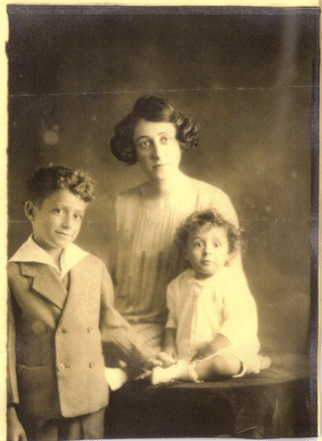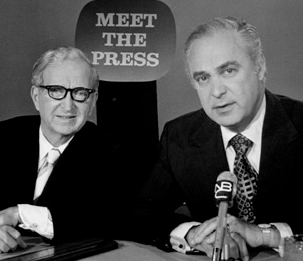|
If you missed Robert Strauss' talk at the Watergate Hotel in January, here are a few of his insightful and instructive recollections of growing up in West Texas.
I grew up in two little towns in West Texas. One was called Hamlin, Texas and the other was called Stamford, Texas. My father was an impoverished small merchant in a community of 2,000 to 3,000 people, in the Depression.
My father had sort of a general store. He had a piano to sell, or he had khaki pants to sell. He had ladies shoes or whatever you wanted -- a general mercantile store.

Robert Strauss with his mother and brother Theodore, in the late 1920s. (Photograph courtesy of Robert S. Strauss.)
[My mother} worked in the store with him. She was the business person of the family. My father was at heart a musician, but he didn't have an opportunity to pursue it, or he wasn't good enough. My mother was born in Texas, in Hempstead, Texas. My father was a German immigrant who came to this country when he was about 20 years old. My father was selling pianos then, and my mother was helping her father in his little store in a town called Lockhart, Texas, where I was born. My parents were married, and my father was traveling, trying to sell pianos out of the San Antonio area in South Texas.
When I was about a year old, my grandfather backed my father and mother so they could open a little store, and they traveled around and decided to open one in West Texas, instead of South Texas where I was born. Lockhart is over near Austin, Texas. The little towns I lived in, Hamlin, Texas and Stamford, Texas, were near Abilene, which is Northwest Texas. We moved there when I was about a year old.
|

Moderator Lawrence Spivak and dRobert Strauss on the long-running political discussion program, Meet the Press. (Photograph courtesy of Robert S. Strauss.)
…We lived in Hamlin for a number of years and then moved 20 miles over to Stamford, Texas. I guess Stamford, Texas had close to 3,000 people, and Hamlin had about 1,500 people, so they left Hamlin and moved to the city of 3,000.
I used to envy people who had intellectual interests that I didn't have and who had intellectual competence or academic competence in areas I didn't have. It wasn't until I was much older, in my twenties -- after I got my law degree and was even practicing law -- that I realized that while most of the people that I went through school with could write a better legal brief than I could write, or could draw better documents than I would prepare, but the strange thing was the clients came to me instead of them. I learned along the way that I had judgment, and that I had a certain character and integrity that attracted people. I had a warm personality. I liked people, they liked me. I learned then that instead of sitting around, envying people who had strengths I didn't have, that I ought to play to my own strengths and quit being paranoid about these other people. I used to resent the fact that they could do those things. Later, I came to realize that they had their strengths, which were certainly valuable and of great value to them, but I had strengths that seemed to attract people who not only wanted a lawyer who understood the law, but they wanted someone who had judgment, and who they could trust and who they felt had integrity. Those were my strengths, and I would play to them. So I quit worrying about others and played to my own strengths and didn't worry about my weaknesses. I have had continued success once I came to grips with that, and was at peace with my strengths and not disturbed by my weaknesses.
My father was a poor businessman and never accumulated any amount of money whatsoever, but he left my brother and me great strength, and one of the great strengths was our ability to like people, and the personality that attracted people and attracted their confidence. I think that has had everything to do with my success in politics and other things. Whenever I have worked with people in politics, I have been successful, and it isn't because I was the smartest politician around, but I was certainly one of the most reliable ones.*
* From the interview of Robert Strauss in 2003 for the virtual Museum of Achievement, the Academy of Achievement.
HOME
|